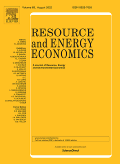
We study the exploitation of recyclable exhaustible resources such as metals that are crucial for the energy transition or phosphorus that is crucial for agricultural production. We use a standard Hotelling model of resource exploitation that includes a primary sector and a recycling sector. We study two polar cases: competitive and monopolistic extraction. We show that, when the primary sector is competitive, the Hotelling’s rule holds and the price of the recyclable resource increases over time. We then show a new reason why the price of an exhaustible resource may decrease: when the primary sector is monopolistic, the primary producer has incentives to delay its production activities in order to delay recycling. As a consequence, the price path of the recyclable resource may be U-shaped. Numerical simulations reveal that the monopolist has an incentive to delay extraction when the recoverability rate is high (because more recycled goods are produced) or when the recoverability rate is low (when fewer recycled goods are expected to be produced in the future). As a consequence, the date of exhaustion of the virgin resource is further away in time for high and low levels of recoverability than for intermediate levels.
